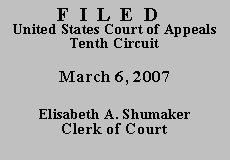

| UNITED STATES OF AMERICA,
Plaintiff - Appellee, v. SALVADOR DURAN, Defendant - Appellant. |
No. 06-4178
(D.C. Nos. 2:06-CV-21-PGC & 2:04-CR-396-PGC) |
The District Court denied the petition and Mr. Duran thereafter filed a motion to reconsider arguing, for the first time, that he received ineffective assistance of counsel during his initial criminal proceeding. The District Court denied this motion as well, citing three grounds: (i) it had no ability under Federal Rule of Civil Procedure 59(e) to reconsider its ruling on a Section 2255 petition; (ii) the new ineffective assistance claim was a second or successive petition; and (iii) in any event, Duran raised the ineffective assistance claim after the one-year statute of limitations associated with Section 2255 expired. The District Court declined to issue a Certificate of Appealability ("COA") on any of the issues presented by Mr. Duran.
Mr. Duran now seeks a COA from this Court pursuant to 28 U.S.C. § 2253. In his application to this Court, Mr. Duran makes a number of arguments, which, as best we can ascertain, boil down to these: (i) the District Court abused its discretion in sentencing him for possession of a Schedule II rather than a Schedule III drug because methamphetamine, at least in powder form, should be treated as a Schedule III drug; and (ii) the type of methamphetamine (powder versus liquid), together with the quantity of drugs at issue, are matters that can only be decided by a jury after Booker and Blakely. Mr. Duran does not seek to appeal the District Court's disposition of his argument regarding ineffective assistance of counsel.
We agree with the District Court that none of these issues merits the issuance of a COA because Mr. Duran has not made a "substantial showing of the denial of a constitutional right." 28 U.S.C. § 2253(c)(2). First, we find unpersuasive Mr. Duran's argument concerning the scheduling of powder methamphetamine. While Congress initially placed most amphetamines in Schedule III rather than Schedule II, in 21 U.S.C. § 812(c) Congress expressly directed that its initial scheduling decisions may be amended "pursuant to section 811." In turn, 21 U.S.C. § 811 provides that "the Attorney General may by rule . . . add to such a schedule [established by Section 812] or transfer between such schedules any drug or other substance" if he complies with certain requirements. 21 U.S.C. § 811(a)(1). And, as it happens, methamphetamine, in all forms, powder or otherwise, has been reclassified by the Attorney General as a Schedule II drug pursuant to 21 C.F.R. § 1308.12(d) and Section 811. See, e.g., United States v. Sullivan, 967 F.2d 370, 372-73 (10th Cir. 1992). Mr. Duran does not raise any challenge to the effectiveness or scope of the rule promulgated by the Attorney General.
Second, Mr. Duran argues that the type and quantity of methamphetamine are issues that, after Booker and Blakely, had to be decided by a jury. Yet, as noted above, all forms of methamphetamine have been properly classified as Schedule II drugs, see 21 C.F.R. § 1308.12(d); accordingly, whether the type of methamphetamine was powder or liquid is of no moment. See United States v. Macedo, 406 F.3d 778, 785 (7th Cir. 2005) ("[W]e now find that the reclassification of methamphetamine as a schedule II substance applies to all forms of methamphetamine in accordance with 21 C.F.R. § 1308.12(d) despite the statute's distinction."). Further, while Booker appears to apply to Mr. Duran's case, given that he was sentenced after it was decided, the clerk's minutes regarding Mr. Duran's sentencing on January 24, 2005, direct one to "[s]ee record for details regarding Booker." The record reveals that, in the written order regarding Mr. Duran's sentence, the District Court expressly stated that it was "exercising its discretion" and followed the Guidelines in imposing Mr. Duran's 87-month sentence. Thus, to the extent Mr. Duran argues that Booker should have been applied to his sentence, we find that it was applied by the District Court.(1) And to the extent Mr. Duran argues that Booker required a jury, as opposed to a judge, to find the quantity of methamphetamine at issue, that argument is squarely precluded by Booker and our precedent. See Booker, 543 U.S. at 233 (holding that "the selection of particular sentences in response to differing sets of facts [under the Guidelines] would not implicate the Sixth Amendment. We have never doubted the authority of a judge to exercise broad discretion in imposing a sentence within a statutory range."); United States v. Hall, 473 F.3d 1295, 1312 (10th Cir. 2007) (rejecting defendant's argument that under Apprendi v. New Jersey, 530 U.S. 466 (2000), Blakely, and Booker, the relevant quantity of drugs for sentencing is no more than the quantity the jury found beyond a reasonable doubt: "Because the post-Booker Guidelines are discretionary, a district court may continue to find facts, including drug quantity, by a preponderance of the evidence.").
For the foregoing reasons, we deny Mr. Duran's application for a COA and dismiss his appeal. So ordered.
ENTERED FOR THE COURT
Neil M. Gorsuch
Circuit Judge
*. This order and judgment is not binding precedent except under the doctrines of law of the case, res judicata and collateral estoppel. It may be cited, however, for its persuasive value consistent with Fed.R.App.P.32.1 and 10th Cir.R.32.1.
1. The District Court was thus apparently mistaken in its § 2255 Order when it dismissed Mr. Duran's motion on the ground that Booker cannot be retroactively applied.